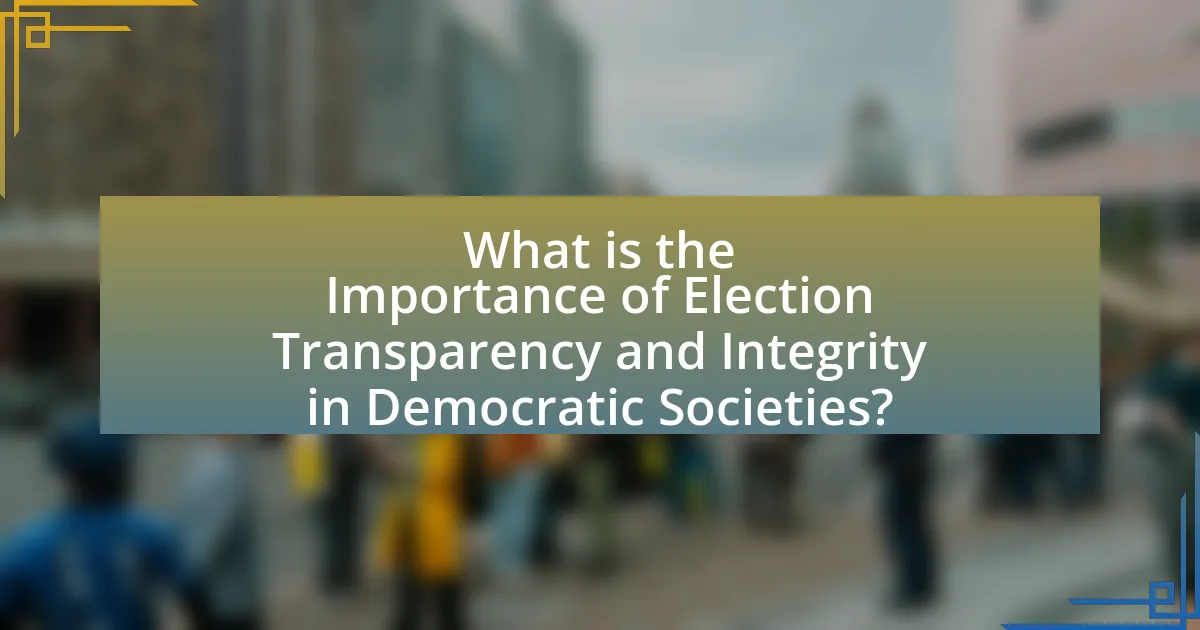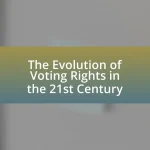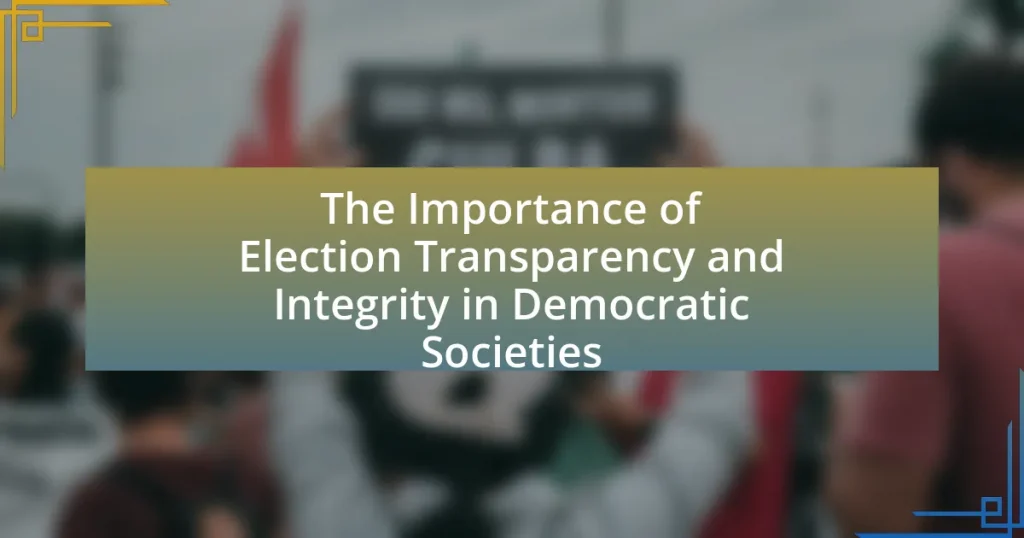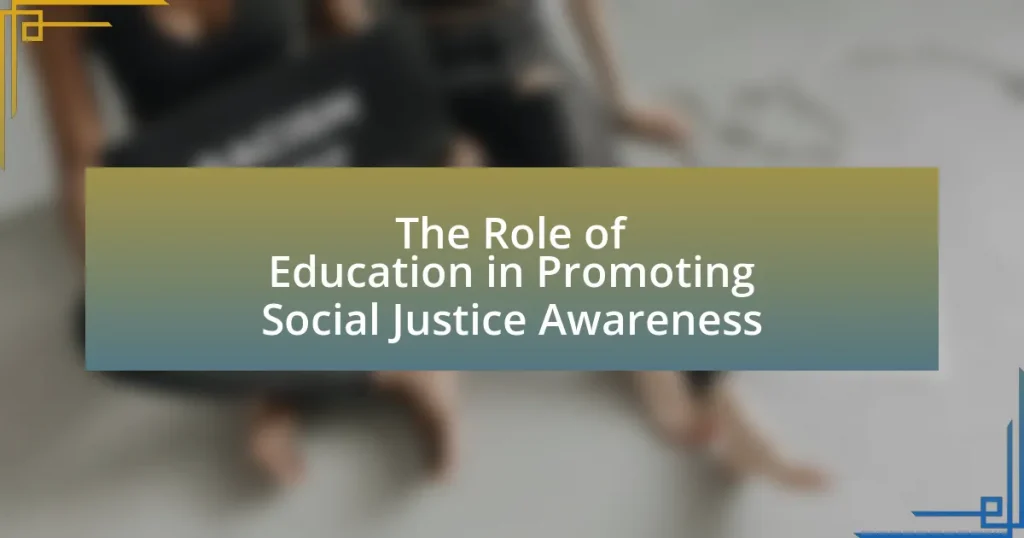Election transparency and integrity are fundamental components of democratic societies, essential for fostering public trust and ensuring the legitimacy of electoral processes. This article examines the significance of transparent elections, highlighting how they enhance voter participation and confidence in government institutions. Key elements of election transparency, such as independent monitoring and public access to data, are discussed alongside the critical components of election integrity, including security and accuracy. The article also explores the consequences of lacking transparency and integrity, historical examples of compromised elections, and best practices for maintaining robust electoral systems, ultimately emphasizing the role of citizens in advocating for transparent and fair elections.

What is the Importance of Election Transparency and Integrity in Democratic Societies?
Election transparency and integrity are crucial for maintaining public trust and legitimacy in democratic societies. When elections are conducted transparently, citizens can verify that the processes are fair and that their votes are counted accurately, which fosters confidence in the electoral system. Research indicates that countries with transparent electoral processes experience higher voter turnout and greater political engagement, as seen in studies by the International Institute for Democracy and Electoral Assistance, which highlight the correlation between transparency and democratic participation. Furthermore, integrity in elections helps prevent fraud and manipulation, ensuring that the will of the people is accurately represented, which is essential for the stability and functionality of democratic governance.
Why is election transparency crucial for democracy?
Election transparency is crucial for democracy because it ensures accountability and fosters public trust in the electoral process. When elections are conducted transparently, citizens can verify that the voting process is fair and that their votes are counted accurately. Historical evidence shows that countries with transparent electoral processes, such as Sweden and Canada, experience higher voter turnout and greater public confidence in government institutions. Conversely, lack of transparency can lead to allegations of fraud and disenfranchisement, undermining the legitimacy of democratic governance, as seen in various instances in countries with opaque electoral practices.
What are the key elements of election transparency?
The key elements of election transparency include open access to electoral processes, independent monitoring, clear communication of election procedures, and public availability of election data. Open access ensures that all stakeholders, including voters and observers, can witness the electoral process, which builds trust. Independent monitoring by neutral organizations, such as international observers, helps verify the integrity of the election. Clear communication of election procedures, including voter registration and ballot counting, allows voters to understand their rights and the process. Public availability of election data, such as results and audits, enables scrutiny and accountability, reinforcing the legitimacy of the electoral outcome. These elements collectively foster confidence in democratic systems and uphold the integrity of elections.
How does transparency impact voter trust?
Transparency significantly enhances voter trust by providing clear and accessible information about electoral processes. When voters perceive that election procedures are open and accountable, they are more likely to believe in the legitimacy of the outcomes. Research indicates that countries with higher levels of electoral transparency, such as Sweden and Canada, report greater public confidence in their electoral systems, with surveys showing trust levels exceeding 80%. This correlation suggests that transparency not only fosters trust but also encourages civic engagement, as informed voters are more likely to participate in elections.
How does election integrity contribute to democratic processes?
Election integrity is essential for democratic processes as it ensures that elections are conducted fairly, transparently, and without fraud. When election integrity is upheld, it fosters public trust in the electoral system, which is crucial for citizen participation and the legitimacy of elected officials. For instance, a study by the National Democratic Institute found that countries with higher levels of electoral integrity experience greater voter turnout and public confidence in government institutions. This correlation highlights that when citizens believe their votes count and the process is secure, they are more likely to engage in the democratic process, thereby strengthening democracy overall.
What are the main components of election integrity?
The main components of election integrity are transparency, security, accuracy, and accessibility. Transparency ensures that the electoral process is open to scrutiny, allowing observers to verify procedures and results. Security involves protecting the election infrastructure from tampering and fraud, which is critical for maintaining public trust. Accuracy refers to the correct counting of votes and the reliability of the voting systems used, ensuring that the results reflect the will of the voters. Accessibility guarantees that all eligible voters can participate in the election process without barriers, promoting inclusivity and fairness. These components collectively uphold the democratic principle that elections should be free, fair, and trustworthy.
How can integrity prevent electoral fraud?
Integrity can prevent electoral fraud by establishing trust in the electoral process, ensuring that all actions are conducted fairly and transparently. When electoral officials and participants adhere to ethical standards, it reduces opportunities for manipulation and deceit. For instance, countries with strong integrity measures, such as independent electoral commissions and stringent auditing processes, have reported lower instances of fraud. According to a study by the International Institute for Democracy and Electoral Assistance, nations that prioritize integrity in their electoral systems experience higher voter confidence and participation, which further deters fraudulent activities.
What are the consequences of lacking election transparency and integrity?
Lacking election transparency and integrity leads to diminished public trust in the electoral process. When citizens perceive elections as unfair or manipulated, they are less likely to participate, resulting in lower voter turnout. For instance, a study by the International Foundation for Electoral Systems found that countries with perceived electoral fraud experienced a 20% decrease in voter participation compared to those with transparent processes. Additionally, the absence of integrity can foster political instability, as disillusioned citizens may resort to protests or civil unrest, undermining democratic governance. Historical examples, such as the 2000 presidential election in the United States, illustrate how contested results can lead to prolonged disputes and a crisis of legitimacy. Thus, the consequences of lacking election transparency and integrity are significant, impacting both civic engagement and the overall health of democracy.
How does a lack of transparency affect voter participation?
A lack of transparency significantly decreases voter participation. When voters perceive that the electoral process is opaque, they often feel distrustful of the system, leading to apathy and disengagement. Research conducted by the Pew Research Center indicates that 70% of Americans believe that transparency in elections is crucial for their participation. Furthermore, studies show that countries with higher levels of electoral transparency experience voter turnout rates that are 10-20% higher than those with less transparency. This correlation highlights the critical role transparency plays in fostering trust and encouraging active participation in democratic processes.
What historical examples illustrate the dangers of compromised elections?
Compromised elections have historically led to significant political instability and social unrest. One prominent example is the 2000 United States presidential election, where issues with ballot design and vote counting in Florida resulted in a Supreme Court decision that effectively awarded the presidency to George W. Bush over Al Gore, despite Gore winning the popular vote. This controversy raised questions about electoral integrity and trust in democratic processes.
Another example is the 1933 German federal election, where the Nazi Party exploited political instability and manipulated the electoral process to gain power. The subsequent establishment of a totalitarian regime demonstrated how compromised elections can lead to the erosion of democracy and human rights.
Additionally, the 2018 presidential election in Venezuela was widely criticized for irregularities, including voter intimidation and manipulation of the electoral process, leading to international condemnation and a crisis of legitimacy for the Maduro government. These instances illustrate that compromised elections can undermine democratic institutions and lead to broader societal consequences.
How can we ensure election transparency and integrity?
To ensure election transparency and integrity, implementing robust systems for monitoring and auditing the electoral process is essential. This includes utilizing independent observers, employing secure voting technology, and ensuring public access to election data. For instance, countries like Canada and Germany have successfully integrated independent electoral commissions that oversee elections, thereby enhancing public trust and accountability. Additionally, the use of paper trails in voting systems allows for verifiable audits, which have been shown to reduce the risk of fraud and errors, as evidenced by studies conducted by the National Institute of Standards and Technology.
What role do independent observers play in elections?
Independent observers play a crucial role in ensuring the integrity and transparency of elections. They monitor the electoral process to verify that it is conducted fairly, impartially, and in accordance with established laws and regulations. Their presence helps to deter fraud, intimidation, and other irregularities, thereby fostering public confidence in the electoral system. For example, organizations such as the Organization for Security and Co-operation in Europe (OSCE) have deployed observers in numerous elections worldwide, providing assessments that highlight both strengths and weaknesses in electoral processes, which can lead to improvements in future elections.
How can technology enhance election transparency?
Technology can enhance election transparency by enabling real-time monitoring and reporting of election processes. For instance, blockchain technology can be utilized to create immutable records of votes, ensuring that each vote is securely logged and easily auditable. Additionally, online platforms can facilitate the dissemination of election-related information, allowing voters to access data about candidates, voting procedures, and election results promptly. A study by the National Democratic Institute found that the use of technology in elections can increase public trust, as it allows for greater scrutiny and accountability in the electoral process.
What best practices can be implemented for maintaining election integrity?
Best practices for maintaining election integrity include implementing robust voter identification laws, ensuring transparent ballot design and counting processes, and utilizing secure voting technology. Voter identification laws help verify the identity of voters, reducing the risk of fraud; for example, states like Indiana and Georgia have seen increased confidence in election outcomes after adopting such measures. Transparent ballot design and counting processes, such as public observation of ballot counting, enhance trust in the electoral system, as evidenced by the successful implementation in countries like Canada. Additionally, secure voting technology, including paper ballots and risk-limiting audits, has been shown to safeguard against tampering, as demonstrated by the 2018 elections in California, which utilized these methods to ensure accuracy and reliability.
What are the most effective methods for auditing election results?
The most effective methods for auditing election results include risk-limiting audits, parallel testing, and post-election tabulation audits. Risk-limiting audits involve manually checking a statistically significant sample of the votes to ensure the reported results are accurate, which has been shown to increase confidence in election outcomes. For example, the National Institute of Standards and Technology recommends this method as it provides a high level of assurance with a relatively low cost. Parallel testing involves running a separate, independent count of the votes alongside the official count to identify discrepancies. Post-election tabulation audits verify the accuracy of vote counting by comparing the official results against a sample of the original ballots. These methods collectively enhance transparency and integrity in the electoral process, as evidenced by their adoption in various jurisdictions to ensure accurate election outcomes.
How can public education improve understanding of election processes?
Public education can improve understanding of election processes by providing comprehensive curricula that cover the mechanics of voting, the significance of civic engagement, and the role of government institutions. Research indicates that states with robust civic education programs report higher voter turnout among young citizens, demonstrating a direct correlation between education and electoral participation. For instance, a study by the Center for Information and Research on Civic Learning and Engagement found that students who receive civic education are more likely to vote and engage in political discussions, thereby enhancing their understanding of the electoral system.
What steps can citizens take to advocate for election transparency and integrity?
Citizens can advocate for election transparency and integrity by actively participating in local governance, engaging in public forums, and supporting legislation that promotes open electoral processes. By attending town hall meetings and community discussions, citizens can voice their concerns and demand accountability from elected officials. Supporting organizations that monitor elections, such as the League of Women Voters, can also enhance transparency efforts. Furthermore, citizens can utilize social media platforms to raise awareness about election integrity issues, mobilizing others to join their advocacy efforts. Research indicates that increased public engagement leads to more robust electoral oversight, as seen in the 2020 U.S. elections where grassroots movements significantly influenced transparency initiatives.















